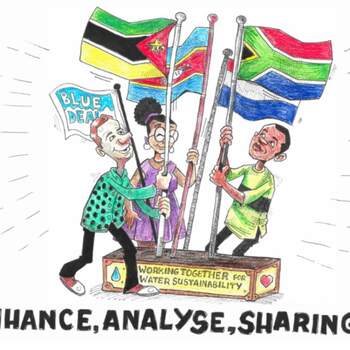History
The need for transboundary cooperation on water is acknowledged for more than 60 years. Portugal and South Africa signed the Cunene Agreement in 1964 for the rivers of mutual interest, specifically the Cunene river between Angola and Namibia (formerly called Southwest Africa). In the following period, the area of interest expanded with schemes in more river basins, such as for the Massingir dam in 1971. Eswatini (formerly called Swaziland) joined in 1967 and Mozambique after its independence in 1975. In 1983 the Tripartite Permanent Technical Committee (TPTC) was established, with the mandate to advise the three governments on matters relating to the utilisation, development, and management of water resources of common interest. In 1991 the tripartite Piggs Peak Agreement on the Incomati River Basin was signed. Various additional bilateral agreements were also developed, and Joint Water Commissions were created between Eswatini and South-Africa, between South-Africa and Mozambique and between Mozambique and Eswatini, to deal with issues of common interest.
During the Johannesburg World Summit on Sustainable Development in 2002, the countries signed the Tripartite Interim Agreement for Cooperation on the Protection and Sustainable Utilisation of the Incomati and Maputo Watercourses (IIMA). A next and ultimate step was to develop a final, comprehensive tripartite agreement. At the regional level 13 members states of the Southern African Development Community (SADC) signed the Revised Protocol on Shared Watercourses in 2000, which offers a comprehensive framework agreement under which river basin agreements can be developed.
PRIMA
In 2006, the Dutch Government approved the PRIMA project, which stands for Progressive Realisation of the Incomati Maputo Agreement. Since February 2007, the Netherlands has been supporting the process of establishing and operationalising the IncoMaputo Commission (INMACOM), to develop a comprehensive tripartite agreement. The funding contract was initially made with the Mozambican National Directorate for Water Affairs (then DNA).
Between 2013 and 2018, the cooperation programme was interrupted due to lack of clarity as to where the Head Quarters of the IncoMaputo Commission would be hosted. It was considered that further investment in the operationalisation of products, equipment and training of staff would require at least some consensus on the location where the Head Quarters of the Commission would be hosted. The Dutch support was renewed when the TPTC agreed that Eswatini would, in principle, become the host country. As the IncoMaputo Commission and the TPTC were no legal entities the Ministry of Mineral Affairs and Energy of Eswatini became the new contract partner of EKN.
With the official signing of the Agreement on the establishment of the Incomati and Maputo Watercourse Commission and the Agreement on the hosting of the Head Quarters of the Commission on 18 November 2021, both the mandate and hosting are formalised.
Spin off
The PRIMA project has also created opportunities for Dutch Water sector contributions, such as the development of the land use scenario model WIBIS, water allocation models, and the HydroNet Water Control Room.
REMCO and Blue Deal
In parallel to this government to governments support, there has been a ‘twinning’ initiative on the Incomati Catchment between the Dutch Water Authority Waterschap Velt en Vecht, now Vechtstromen, and the South African Komati/Maputo Management Agency (IUCMA), called REMCO. This twinning is focused on operational tasks of the water basin authorities. The initiative also developed a tripartite exchange with Mozambique, eSwatini and South Africa for the Incomati and Maputo basins.
Also the Blue Deal programme of the Dutch Water Authorities is contributing to a tripartite exchange.
References
Ashton et al (2006). A compilation of all international fresh water agreements entered into by South Africa with other states; a WRC report nr. 1515/1/06
SADC (2000). Revised protocol on shared water courses in the Southern African Development Community
SADC (2020). Regional Strategic Action Plan /Integrated Water Resources Development and Management Phase V (2021-2025)
Websites:
INMACOM: https://inmacom.info/
https://www.cgiar.org/news-events/news/modeling-the-incomati-river-basin-to-enhance-transboundary-benefit-sharing/
Version management: main author D. Bouman, September 2024

